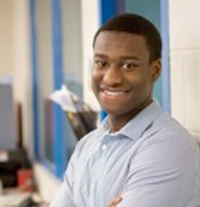42nd Annual MLK Celebration Leadership Award Recipient: Rasheed Auguste
Rasheed Auguste
MIT Class of 2017
42nd Annual MLK Leadership Award

MIT News Spotlight
"Nuclear engineering student advocates for change on campus and Capitol Hill"
7 December 2016
Excerpt:
As a sophomore, he served as the secretary of the Black Students’ Union (BSU), and as a junior he became the BSU’s political action co-chair. Every year, the political action committee organizes a leadership initiative, but “I didn’t know what I wanted to do,” says Auguste, who felt anxious about the high bar set by former committee chairs.
“Then came everything happening at Yale and University of Missouri, which was near the Black Lives Matter stuff that had gone on, but fine-tuned to college campuses, so it was even more pressure. Now it’s not just being a black person, but a black person in an institution of higher learning, specifically at a predominantly white institution. It was definitely like ‘ok what does MIT want to do?’ It was up to me to coordinate that response.”
Students across the country began bringing lists of demands to their administrations, and as Auguste thought about how the BSU would respond, he and the leaders of the Black Graduate Student Association (BGSA) received an email from MIT President L. Rafael Reif, wanting to meet in the BSU lounge. “It’s great because it is our space, and [he] asked how we are doing during this time of national focus,” Auguste says. At the end of the meeting, Reif inquired about what he and the MIT administration could to do improve the lives of underrepresented minority students at MIT.
In the following weeks, Auguste and his friend and fellow senior Alberto Hernandez joined with others from Chocolate City, the student community and living group that Auguste has been a part of since his first year. They began interviewing offices that deal with various aspects of student life — mental health, research, advising and academic programming — about specific things MIT could do to support minority students. But they also turned to students for recommendations.
“You have to ask people what they can do, and you have to ask people what they want,” Auguste says. He and Hernandez held office hours, circulated Google forms, and visited student groups.
“MIT does a lot of things well. We do data very very well, we listen to data very very well, and we like numbers. A pretty big chunk of the recommendations had to do with data, and how we are going to act on it,” Auguste says.